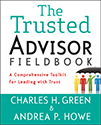This post is part of our Weekly Tips series.
The practice of “thinking out loud” was first introduced in Charlie Green’s book, Trust-Based Selling, although make no mistake—its benefits aren’t limited to sales situations.
Thinking out loud means sharing the very formation of your thoughts in a transparent way. As in, “So if the real issue is abc, well, hmmmm … there are a few different ways to approach it …” or “It sounds like you’re primary focus is xyz. Thinking out loud about that, seems like one important consideration would be …”
Thinking out loud builds trust because:
- It makes you human. You trade polished and articulate for unrefined and real.
- It shows your commitment to collaboration. You prove you’re more concerned about advancing the conversation and less concerned about how you look.
- It invites participation. Others have an opportunity to contribute to your partly-formed ideas.
- It frees you up to be a better listener. When you’re not so worried about having an answer that’s just right or perfectly expressed, you can really focus on listening to hear, rather than listening to respond.
Of course I’m not suggesting you unleash your uncensored self on your clients and colleagues. I’m saying allow yourself to speak in “rough draft.” Have the courage to bring a little more candor, vulnerability, and humility to your interactions.
Bonus: Making it Real
This week, make thinking out loud a regular practice. Find opportunities in conversations or meetings to do your thinking on the spot. Lead with phrases like, “Well, thinking out loud about this, I see a few possibilities …” or “Let’s think out loud about what might make sense here …”
Learn More

- Read about collaboration as a strategy not a tactic, from our friends at Trusted Advisor Associates, or learn about other ways to get practice improvising (no, that’s not an oxymoron) in Chapter 8 of The Trusted Advisor Fieldbook: A Comprehensive Toolkit for Leading with Trust.
Andrea Howe
Latest posts by Andrea Howe (see all)
- Role models for healthy candor - May 27, 2025
- A small gesture (and related risk) with big trust impact (Part II) - April 1, 2025
- A small gesture (and related risk) with big trust impact (Part I) - March 3, 2025

Hi Andrea,
Thought I would also share that the practice of “thinking out loud” is one that is also promoted in educational contexts…in that it helps those who are more novices to an area learn how problems or situations are thought through by someone with more experience or knowledgeable in that some domain area. The learner doesn’t just learn about the new domain content but also how more knowledgeable people tend to think about or approach the content. It also prevents the situation in which the learner is left wondering, so how did they get from here to there — but instead get some insight into the “why” someone is taking the actions that they are rather than just the actions taken.
Marianne
This is very interesting, Marianne, and seems to me to be tightly connected to developing “conscious competence” as a trusted advisor—including the critical role that understanding the why’s and wherefore’s plays into that. Thank you!